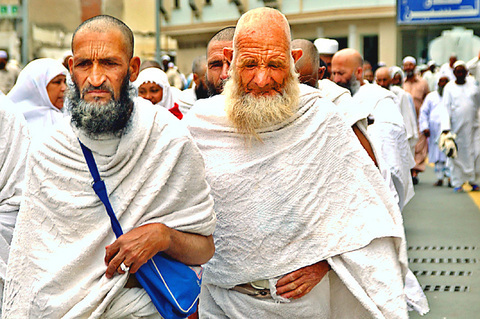Saudi security forces trained specially for the annual hajj have been deployed to the kingdom's holy sites as some 1.8 million pilgrims converged on Mecca for the pilgrimage which started yesterday.
Security men "who have been trained and deployed in previous hajj seasons, in addition to those trained this year, will do the job," Interior Minister Prince Nayef bin Abdul Aziz said during a visit to Mecca.

PHOTO: AP
Pictures of parading armed security men, armored vehicles, helicopters, fire brigades and ambulances were spread across local newspapers following the minister's inspection tour on Saturday of security procedures for the largest annual Muslim gathering.
Saudi Arabia has been battling a wave of violence by al-Qaeda-linked militants who have carried out a spate of attacks that have left more than 100 people dead, including many foreigners, since May 2003.
Nayef said security forces remained alert to combat terrorists across the kingdom, adding that "events speak for themselves," in reference to recent efforts by security authorities in combating Islamist militants.
Four wanted militants were killed on Jan. 9 in a shootout with security forces in a desert area, while 10 others, including two of the kingdom's most wanted men, were killed last month in two days of clashes in Riyadh.
The incidents occurred before and after two car bombings against security targets in Riyadh on Dec. 29, including the interior ministry itself.
"If something happens, or if there is an intention [to carry out terrorist attacks], it will be fought with conviction and all [our] strength," Nayef said.
An interior ministry spokesman earlier said that more than 50,000 security men had been deployed for the hajj season.
"More than 50,000 security men are taking part in the plan to secure the hajj," Brigadier Mansur al-Turki said, adding that 70 to 80 percent of their task is "primarily concerned with traffic control and ensuring the safety of pilgrims."
More than 10,000 officers are "to deal with any developments related to security matters," he said.
"We have dealt with terrorist attacks in the holy city of Mecca before" out of the hajj season, Turki said. "We only increase manpower during the hajj season to cope with the increase in the numbers of pilgrims."
The desert kingdom, home to two of Islam's holiest sites, Mecca and Medina, last year received 1.4 million foreign pilgrims, in addition to some 473,000 from within the country.
Last year's hajj saw 251 pilgrims trampled or suffocated to death during a stampede as they vied to stone three pillars representing the devil in Mina, near Mecca.
All Muslims are required to make the pilgrimage to Mecca, one of the five pillars of Islam, at least once in their lifetime if they have the means to do so.
For days pilgrims have been flooding into the birthplace of Mohammed to take part in the annual rituals, which will climax today on Mount Arafat. Eid al-Adha, the Feast of the Sacrifice, will start tomorrow.

VAGUE: The criteria of the amnesty remain unclear, but it would cover political violence from 1999 to today, and those convicted of murder or drug trafficking would not qualify Venezuelan Acting President Delcy Rodriguez on Friday announced an amnesty bill that could lead to the release of hundreds of prisoners, including opposition leaders, journalists and human rights activists detained for political reasons. The measure had long been sought by the US-backed opposition. It is the latest concession Rodriguez has made since taking the reins of the country on Jan. 3 after the brazen seizure of then-Venezuelan president Nicolas Maduro. Rodriguez told a gathering of justices, magistrates, ministers, military brass and other government leaders that the ruling party-controlled Venezuelan National Assembly would take up the bill with urgency. Rodriguez also announced the shutdown

Civil society leaders and members of a left-wing coalition yesterday filed impeachment complaints against Philippine Vice President Sara Duterte, restarting a process sidelined by the Supreme Court last year. Both cases accuse Duterte of misusing public funds during her term as education secretary, while one revives allegations that she threatened to assassinate former ally Philippine President Ferdinand Marcos Jr. The filings come on the same day that a committee in the House of Representatives was to begin hearings into impeachment complaints against Marcos, accused of corruption tied to a spiraling scandal over bogus flood control projects. Under the constitution, an impeachment by the

Exiled Tibetans began a unique global election yesterday for a government representing a homeland many have never seen, as part of a democratic exercise voters say carries great weight. From red-robed Buddhist monks in the snowy Himalayas, to political exiles in megacities across South Asia, to refugees in Australia, Europe and North America, voting takes place in 27 countries — but not China. “Elections ... show that the struggle for Tibet’s freedom and independence continues from generation to generation,” said candidate Gyaltsen Chokye, 33, who is based in the Indian hill-town of Dharamsala, headquarters of the government-in-exile, the Central Tibetan Administration (CTA). It

China executed 11 people linked to Myanmar criminal gangs, including “key members” of telecom scam operations, state media reported yesterday, as Beijing toughens its response to the sprawling, transnational industry. Fraud compounds where scammers lure Internet users into fake romantic relationships and cryptocurrency investments have flourished across Southeast Asia, including in Myanmar. Initially largely targeting Chinese speakers, the criminal groups behind the compounds have expanded operations into multiple languages to steal from victims around the world. Those conducting the scams are sometimes willing con artists, and other times trafficked foreign nationals forced to work. In the past few years, Beijing has stepped up cooperation